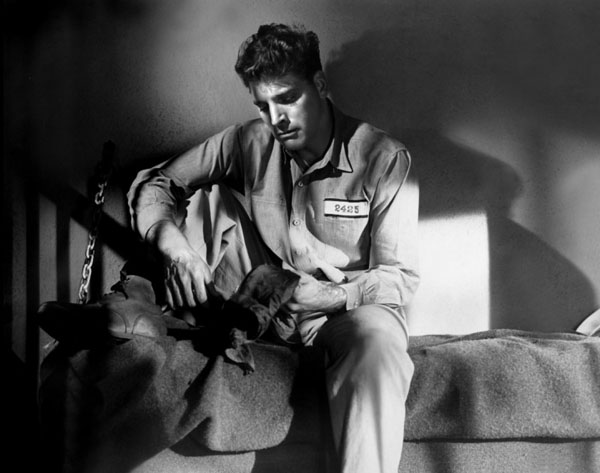Today marks the 100th anniversary of the birth of Burt Lancaster (he died in 1994 at the age of 80) and the celebrating’s been going on pretty much all year long. There have been retrospectives at the Film Society of Lincoln Center, the Harvard Film Archive, Eastman House, and there’s one happening right now at Cornell.
The Telegraph‘s David Gritten wonders “how many of today’s Hollywood leading men can compare with him? Sure, there are those who trade effectively on their looks and physique; others can play deep, introspective roles, while some excel at playing tough guys. And there are a few modern actors with the nous to carve out their own careers, setting themselves up as independent producers, alternating between big and small movies, while dipping in and out of the Hollywood studio system as they choose. But it’s hard to name one who can do all those things, as Lancaster did in his long, varied career. Come to think of it, it’s hard to name one with his screen presence or sheer versatility.” Gritten also lists his top ten Lancaster movies.
“Burt Lancaster’s greatest performance?” asked the Boston Globe‘s Mark Feeney this summer. “That would be as Prince Fabrizio in The Leopard (1963), also his greatest film, or as elderly numbers runner Lou Pascal in Atlantic City (1981). But to appreciate what made Lancaster’s career unique, begin with From Here to Eternity (1953)…. The sight of surf pounding Lancaster and Deborah Kerr as they lie on a Hawaiian beach locked in an adulterous embrace is among the most indelible images of carnality in Hollywood history.” Listing umpteen further great performances, Feeney adds: “There’s no such thing as ‘a Burt Lancaster picture,’ the way there is, say, a Clint Eastwood picture or Cary Grant picture…. Several factors accounted for the diversity. Lancaster was 33 when The Killers [1946, his debut] opened. So he was making up for lost time. He also fell between generations: slightly too old for Studio Era stardom, not quite young enough for the Method generation of Clift and Paul Newman and Marlon Brando. Lancaster never quite fit in. He was a school of one.”
John Frankenheimer narrates
At the Film Experience, Anne Marie notes that, though he was nominated four times, Lancaster won only one Oscar—for his performance in the title role of Richard Brooks’s Elmer Gantry (1960), “a role tailor-made for Lancaster’s particular brand of charm. Gantry is a con man who starts starts evangelizing at revivals because he wants to get into the habit of Sister Sharon (Jean Simmons). Gantry is a bad man preaching the Good Book…. Lancaster roars and cajoles and cries while he’s preaching, but his quiet moments are equally powerful.”
Update: Back in May, writing for Film Comment, Nick Pinkerton revisited Lancaster’s work with Robert Aldrich. They “made four films together. The last, 1977’s Twilight’s Last Gleaming, is a geopolitical thriller. The other three are Westerns: Apache and Vera Cruz—both released in 1954, through United Artists—and Ulzana’s Raid, almost two decades later. And while Ulzana’s Raid is practically the product of another world with regard to what was permissible in depicting screen violence and the historical West, it’s also a mirror-image of Apache, the two works in dialogue with one another across the years.”
For news and tips throughout the day every day, follow @KeyframeDaily on Twitter and/or the RSS feed. Get Keyframe Daily in your inbox by signing in at fandor.com/daily.




